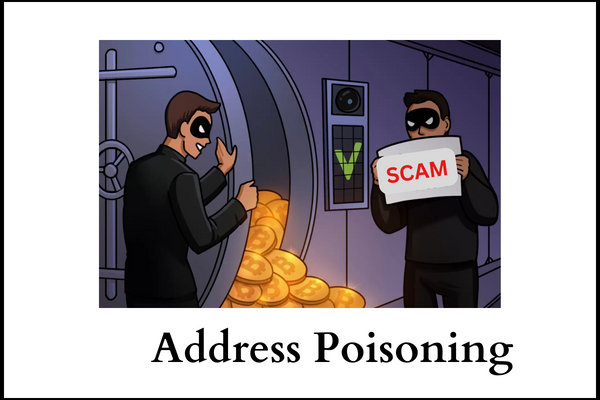There are many scams associated with the crypto space.
And you might be unfamiliar with “Address Poisoning”, which is one of these scams.
Address poisoning is a scam that is becoming increasingly prevalent in the cryptocurrency space.
I’ll tell you everything you need to know about it and how to stay safe in this post.
Make sure to grab your pen and paper and endeavour to read to the end.
Post Summary
This is what I intend to cover:
What Exactly Is Address Poisoning?

It is a new scam in which a victim unknowingly transfers funds to the address of the con artist.
Right now, I bet you are wondering how this could play out.
Let’s start with the structure of a cryptocurrency wallet address.
Every typical crypto wallet address is generated cryptographically and contains a long string of letters and numbers, which makes them hard to memorize.
As a result, if one is not careful, they can send their crypto to the wrong address.
Here is how Address Poisoning works:
i. Let’s say you sent a coin to a friend from your wallet
ii. A con artist discovers your address through a token transfer tracker and obtains it
iii. He then crafts an address that looks similar to yours using a vanity address generator. The address may, for instance, have the same first and last four characters as yours.
iv. After doing so, he tries to outwit you by sending a transaction of little to no value to your wallet.
Imagine receiving a transaction of 0.00001 TRX from an unknown wallet. Yeah!
However, unbeknownst to you, the scammer has just poisoned your address.
v. Finally, if by chance you go to your transaction history to copy the address, thinking it is yours by merely looking at the first and last character, you will end up sending coins to the con artist.
So, that’s how Address Poisoning works!
Note:
Address poisoning relies on the victim’s carelessness to steal funds.
The reason is that “address poisoning” is harmless in a wallet.
It can only potentially result in a loss of funds if the victim sends funds to the wrong address, mistaking it for his own.
So, how can you avoid becoming a victim? I’ve provided some pro tips in the section below.
How To Stay Safe From Address Poisoning
1. Check more than just the first and last characters of your address.
Always verify that it is truly your wallet address before sending coins.
Because crypto addresses are so long, most wallet applications, like Metamask, try to condense them by revealing only the first and last characters, omitting the middle characters.
To play it safe, ensure that you check every single character of your address before sending coins.
2. Refrain from copying addresses from your transaction history
Do not copy your wallet address from transaction history; instead, endeavour to always follow the right process.
For example, let’s say you are a Metamask user.
Your address is always shortened and displayed under the inscription “Account 1,” which you can edit if you want to.
Make sure you always go there to copy your address, rather than going through the transaction history.
Also, you can click on the three dots on your screen and select “Account details” to view your full wallet address.
3. Use test transactions if you can
As a precaution, you can start by sending a little sum of money to the supposed address.
If you receive the transaction successfully, then you can proceed to send the complete transaction without a doubt.
This helps you manage losses and identify a poisoned address.
4. Get a hardware wallet
This is because, before you can complete a transaction, hardware wallets typically demand that you check and confirm any address you’re sending to.
Note that, despite this feature, you can still become a victim of this scam. However, it prompts you to double-check the address you’re sending to.
In addition, it is true that there are hot wallets that have this feature; however, the impregnable security features of hardware wallets cannot be undermined.
Here are some hardware wallets you may like to get:
It’s time to call it a wrap!
Heads up!

Conclusion
To sum it up, address poisoning is a type of scam where a scammer sends you a small amount of coin or NFT.
If you fall for it, you will end up sending coins to his wallet address mistaking it for your own.
The best way to prevent this scam is to cross-check the supposed address before sending coins.
Did you enjoy the post? You can tell me:
Have you experienced address poisoning before?
Or do you have other questions regarding it?
Tell us what you think in the comment section below. Thanks!



0 Comments